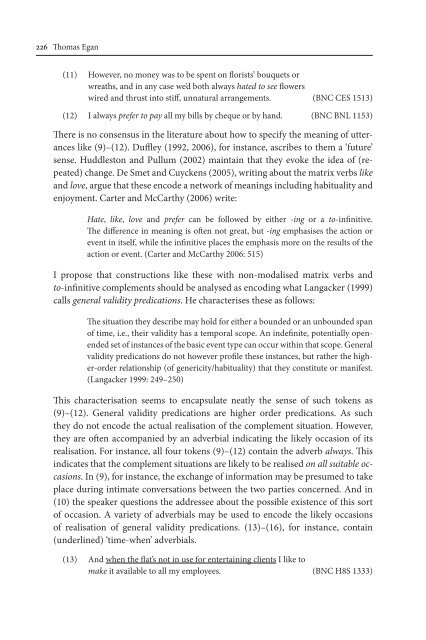Selected Papers from the Fourteenth International ... - STIBA Malang
Selected Papers from the Fourteenth International ... - STIBA Malang
Selected Papers from the Fourteenth International ... - STIBA Malang
You also want an ePaper? Increase the reach of your titles
YUMPU automatically turns print PDFs into web optimized ePapers that Google loves.
226 Thomas Egan<br />
( ) However, no money was to be spent on florists’ bouquets or<br />
wreaths, and in any case we’d both always hated to see flowers<br />
wired and thrust into stiff, unnatural arrangements. (BNC CES 5 3)<br />
( 2) I always prefer to pay all my bills by cheque or by hand. (BNC BNL 53)<br />
There is no consensus in <strong>the</strong> literature about how to specify <strong>the</strong> meaning of utterances<br />
like (9)–( 2). Duffley ( 992, 2006), for instance, ascribes to <strong>the</strong>m a ‘future’<br />
sense. Huddleston and Pullum (2002) maintain that <strong>the</strong>y evoke <strong>the</strong> idea of (repeated)<br />
change. De Smet and Cuyckens (2005), writing about <strong>the</strong> matrix verbs like<br />
and love, argue that <strong>the</strong>se encode a network of meanings including habituality and<br />
enjoyment. Carter and McCarthy (2006) write:<br />
Hate, like, love and prefer can be followed by ei<strong>the</strong>r -ing or a to-infinitive.<br />
The difference in meaning is often not great, but -ing emphasises <strong>the</strong> action or<br />
event in itself, while <strong>the</strong> infinitive places <strong>the</strong> emphasis more on <strong>the</strong> results of <strong>the</strong><br />
action or event. (Carter and McCarthy 2006: 5 5)<br />
I propose that constructions like <strong>the</strong>se with non-modalised matrix verbs and<br />
to-infinitive complements should be analysed as encoding what Langacker ( 999)<br />
calls general validity predications. He characterises <strong>the</strong>se as follows:<br />
The situation <strong>the</strong>y describe may hold for ei<strong>the</strong>r a bounded or an unbounded span<br />
of time, i.e., <strong>the</strong>ir validity has a temporal scope. An indefinite, potentially openended<br />
set of instances of <strong>the</strong> basic event type can occur within that scope. General<br />
validity predications do not however profile <strong>the</strong>se instances, but ra<strong>the</strong>r <strong>the</strong> higher-order<br />
relationship (of genericity/habituality) that <strong>the</strong>y constitute or manifest.<br />
(Langacker 999: 249–250)<br />
This characterisation seems to encapsulate neatly <strong>the</strong> sense of such tokens as<br />
(9)–( 2). General validity predications are higher order predications. As such<br />
<strong>the</strong>y do not encode <strong>the</strong> actual realisation of <strong>the</strong> complement situation. However,<br />
<strong>the</strong>y are often accompanied by an adverbial indicating <strong>the</strong> likely occasion of its<br />
realisation. For instance, all four tokens (9)–( 2) contain <strong>the</strong> adverb always. This<br />
indicates that <strong>the</strong> complement situations are likely to be realised on all suitable occasions.<br />
In (9), for instance, <strong>the</strong> exchange of information may be presumed to take<br />
place during intimate conversations between <strong>the</strong> two parties concerned. And in<br />
( 0) <strong>the</strong> speaker questions <strong>the</strong> addressee about <strong>the</strong> possible existence of this sort<br />
of occasion. A variety of adverbials may be used to encode <strong>the</strong> likely occasions<br />
of realisation of general validity predications. ( 3)–( 6), for instance, contain<br />
(underlined) ‘time-when’ adverbials.<br />
( 3) And when <strong>the</strong> flat’s not in use for entertaining clients I like to<br />
make it available to all my employees. (BNC H8S 333)










